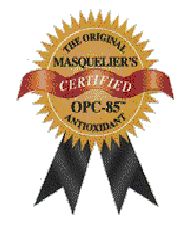|
VICUS.COM
(26 Feb. 2000) -- Dr. Jacques Masquelier is not happy.
Fifty years ago he "invented the pine bark and grape seed
extraction process" that yields the flavanoid pycnogenol.. Today,
he is prevented from selling his invention in the United States.
On his website,
http://www.healthysource.com/pyc.h%20%20tml,
the reader is immediately warned, "Not all pycnogenols are
created equal. The extraction process is extremely important. If
flavonols are not extracted properly, it is possible to end up with a
substance that actually becomes a dangerous oxidant in the body."
There are charts, tables,
54 literature references (mostly in French and many not actually
published), and seemingly unending text extolling the virtues of
pycnogenols, as well as more warnings that not all pycnogenols are the
same.
It appears that Dr.
Masquelier named and trademarked his invention "Pycnogenol,"
in France, but his former international broker, a company called
Horphag, carried out a "coup," and trademarked pycnogenol
under its name in the United States. Then they changed
extraction-manufacturing companies and, according to Dr. Masquelier,
now sell a "different pine bark-based extract," which is
neither manufactured nor endorsed by Dr. Masquelier.
 To
help customers distinguish Masquelier's French pycnogenol from other
pycnogenols, Dr. Masquelier assigns a seal of authenticity to his
product. To
help customers distinguish Masquelier's French pycnogenol from other
pycnogenols, Dr. Masquelier assigns a seal of authenticity to his
product.
The
American response
Not to be
outdone, Horphag Research has countered with its own equally irate
and, some say, shamelessly self-promoting website, http://www.pycnogenol-%20%20usa.com/index.htm,
complete with its own seal of authenticity and American flag logos.
Nick
Mangeris is the chairman and founder of TurningPoint Technologies,
Inc., the international pycnogenol consultant for Horphag Research,
Ltd. According to Mr. Mangeris, if a product does not have the Horphag
seal, then it isn't pycnogenol.
What's a
consumer to do?

If this is
true, then there are many brands of pycnogenol for sale that do not meet
with Mr. Mangeris' or Dr. Masquelier's approval. An informal survey of
GNC and Vitamin Shoppe stores revealed that only one of five brands of
pycnogenol surveyed (sold at GNC) had the Horphag seal. As expected,
none had Dr. Masquelier's seal. In fact, most of the better-known brands
in nutritional supplements (e.g., Vitamin Shoppe, Twin Labs, Schiff
Products, Solgar Co.) included no seal of approval on their labels.
Does it make a difference?
A growing volume of clinical and laboratory research
supports the role of pycnogenol as a super-scavenger of oxygen free
radicals. Dr. Masquelier provides a long list of benefits attributed to
pycnogenol on his website (see list below). However, many U.S.
researchers are awaiting results of well-controlled clinical trials
before most health-care practitioners accept many of these purported
benefits.
What can be said with confidence is that pycnogenol is
an active flavonoid with promising actions on the heart and blood
vessels. Additional studies in other conditions are needed to confirm
that its biochemical effects will translate into measurable clinical
benefits in people.
Benefits of pycnogenol, according to Dr. Masquelier
Reduces risk of:
Strengthens blood vessels and:
-
Maintains proper capillary permeability
-
Reduces capillary fragility
-
Reduces bruising
-
Strengthens capillaries, veins and arteries
-
Reduces the severity of sports injuries
-
Reduces varicose veins
-
Reduces edema and swelling of the legs
-
Treats chronic venous insufficiency, and
-
Reduces the risk of phlebitis
Skin health effects:
Effects on inflammation:
Effects on diabetes:
Immune system effects:
Ophthalmologic effects:
Gastrointestinal effects:
Effects on red blood cells:
John
Russo, Jr. PharmD is senior vice president of medical
communications at Vicus.com. He is a pharmacist and medical writer with
more than 20 years of experience in medical education.

|